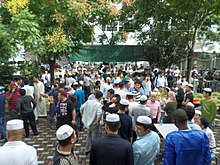Islam in China
Appearance

Islam has been practiced in China for about 1,400 years.[1] Muslims are a minority group in China, representing between 0.45% to 2.85% (6 million to 39 million) of the total population. Though Hui Muslims are the most numerous group, the greatest concentration of Muslims is in Xinjiang, with a significant Uyghur population. Lesser but significant populations reside in the regions of Ningxia, Gansu and Qinghai. Of China's 55 officially recognized minority peoples, ten groups are Sunni Muslim.
Quotes
[edit]- The situation of the Muslims of China was very different. They were geographically remote from the Muslim heartlands— in contrast to the Muslims of India, whose contacts were so close that to a large extent they transacted their affairs in Persian... The result was the appearance of a Muslim literature in Chinese that pressed the argument that Confucian and Muslim values were fully compatible, if not identical. Thus an inscription purportedly dating from 742, but likely to have been forged by Chinese Muslims in the Ming period, says of Confucius and Muḥammad that “their language differed, yet their principles agreed.”... Nor is Islamic-Confucian syncretism likely to have cut much ice with the Chinese elite. One prominent Chinese Muslim author was able to persuade some Confucian scholars to write laudatory prefaces for his books, and the title of his heavily Confucianized work on Muslim ritual found a place in an imperial compendium of 1773–1782. But the work was placed in the company of books that “contained little that was praiseworthy and much that was contemptible,” and an editorial comment, while conceding that the author’s literary style “is actually rather elegant,” maintained that “the clever literary ornamentation does him no good” for the simple reason that “Islam is fundamentally far-fetched and absurd.”
- Cook, Michael - Ancient religions, modern politics _ the Islamic case in comparative perspective-Princeton University Press (2014)
- Islam has been one of the main targets in the Chinese government’s campaign against the Uyghurs, and Islamophobia is being tacitly encouraged by Communist party authorities. Students, peaceful academics and even ordinary people for the simple reason for being Muslims are being jailed, with a massive high-tech surveillance state that monitors and judges every movement, subjecting the widely marginalised Uyghur people to a brutal siege. Internment camps have been set up with up to a million prisoners being indoctrinated and ‘re-educated’, leading to empty neighbourhoods, with major mosques in the major cities of Kashgar and Urumqi standing deserted. Prisoners in the camps are also being compelled to renounce God and embrace the Chinese Communist Party doctrines and prayers, religious education, and the fasting in the month of Ramadan being increasingly restricted or banned. Those who disobey are reportedly subject to torture such as solitary confinement, deprivation of food, water and sleep, and even waterboarding. The reason that so many are being held is because most are arrested for no discernible reason, other than to curb religious practice and erase Uyghur culture.
- Lukman Harees, Why The Muslim World Is Silent Over China's Repression of Uyghurs, World Uyghur Congress, 2 January 2019
- Tibet languished under China’s despotism and its levels of literacy and material provision remained low; and the construction of a railway across its territory, much vaunted in Beijing as showing its wish to share the benefits of modernisation, was seen by Tibetans as a means of reinforcing central control. Great regions such as Xinjiang in the north-west of the People’s Republic were held in a suffocating grip. There the Chinese authorities feared that Islam and Uigur nationalism might breed a separatist movement. Freedom of religious expression was only patchily respected across China. Falun Gong, an indigenous faith of massive popularity, was systematically persecuted.
- Robert Service, Comrades!: A History of World Communism (2010)

